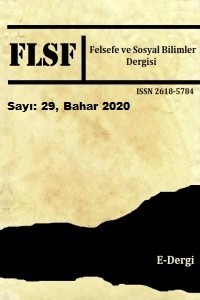Abstract
In this paper, I discuss the place of the notion of “earth” (Erde) in Thus Spoke Zarathustra. Nietzsche imagines a culture that is profoundly loyal to the earth, to becoming, to the concrete reality and says no to any otherworldly aspirations. At the center of this culture lies an emphasis on love, more specifically on a procreative eros. For Nietzsche, modernity represents an enormous violence exerted on body and on creative life energies, which actually proves to be a self-violence whose presupposition is a culture based on an unbounded faith in rationality, of rational explicability of reality (earth), which Nietzsche associates with the priority accorded to truth itself in the Western tradition. Nietzsche, however, envisages an earth-minded humanity serving the meaning of the earth and places this in opposition to the alienation of modernity.
References
- FICHTE, J. G. The Vocation of Man, trans. P. Preuss (Indianapolis: Hackett Publishing, 1987).
- KANT, I. Kant’s Idea for a Universal History with a Cosmopolitan Aim, ed. A. Rorty and J. Schmidt (Cambridge: Cambridge University Press, 2009).
- KANT, I. Critique of the Power of Judgement, trans. Paul Guyer and Eric Matthews (Cambridge: Cambridge University Press, 2000).
- KAUFMANN, WALTER. Nietzsche: Philosopher, Psychologist, Antichrist (Princeton: Princeton University Press, 1974).
- LAMPERT, LAWRENCE. Nietzsche’s Teaching: An Interpretation of Thus Spoke Zarathustra (New Haven: Yale University Press, 1986).
- NIETZSCHE, F. Thus Spoke Zarathustra, trans. Adrian Del Caro (Cambridge: Cambridge University Press, 2006).
- NIETZSCHE, F. Also Sprach Zarathustra, in Kritische Studienausgabe, vol. 4, ed. G. Colli and M. Montinari (München: De Gruyter, 1999).
- NIETZSCHE, F. The Anti-Christ, Ecce Homo and Twilight of the Idols, trans. Judith Norman (Cambridge: Cambridge University Press, 2005).
- NIETZSCHE, F. The Birth of Tragedy, trans. Ronald Speirs (Cambridge: Cambridge University Press, 2005).
- PIPPIN, ROBERT. Interanimations: Receiving Modern German Philosophy (Chicago: The University of Chicago Press, 2014).
- PLATO. Phaedrus, trans. Robin Waterfield (Oxford: Oxford University Press, 2002).
- PLATO. Symposium, trans. Christopher Gill (Penguin Classics, 1999).
- ROSEN, STANLEY. The Mask of Enlightenment: Nietzsche’s Zarathustra (Cambridge: Cambridge University Press, 1995).
- SHAPIRO, GARY. Nietzsche’s Earth: Great Events, Great Politics (Chicago: The University of Chicago Press, 2016).
- YOUNG, JULIAN. Nietzsche’s Philosophy of Religion (Cambridge: Cambridge University Press, 2006).
Abstract
Bu makalede Nietzsche’nin Böyle Buyurdu Zerdüşt adlı eserinde arz (Erde) kavramının yerini mütalaa ediyorum. Nietzsche arza, olagelişe, somut realiteye tümüyle sadık ve öte-dünyacı heves ve temayüllere hayır diyen bir kültür hayal etmektedir. Bu kültürün merkezinde aşka, daha spesifik olarak prokreatif eros’a yapılan bir vurgu yatmaktadır. Nietzsche’ye göre, modernite bedene ve yaratıcı yaşam enerjisine yöneltilmiş muazzam bir şiddeti temsil etmektedir. Bu gerçekte insanın kendine yönelttiği bir şiddettir, temeli ise rasyonaliteye, gerçekliğin (arz) rasyonel açıklanabilirliğine yönelik sınırsız bir inançtır. Nietzsche Batı geleneğinde hakikate izafe edilen önceliği bu tutumla birlikte ele alır. Nietzsche, buna mukabil, arzın anlamına hizmet eden arz-bilinçli bir beşeriyet tasavvur etmekte ve bunu modern yabancılaşmanın karşısına yerleştirmektedir.
References
- FICHTE, J. G. The Vocation of Man, trans. P. Preuss (Indianapolis: Hackett Publishing, 1987).
- KANT, I. Kant’s Idea for a Universal History with a Cosmopolitan Aim, ed. A. Rorty and J. Schmidt (Cambridge: Cambridge University Press, 2009).
- KANT, I. Critique of the Power of Judgement, trans. Paul Guyer and Eric Matthews (Cambridge: Cambridge University Press, 2000).
- KAUFMANN, WALTER. Nietzsche: Philosopher, Psychologist, Antichrist (Princeton: Princeton University Press, 1974).
- LAMPERT, LAWRENCE. Nietzsche’s Teaching: An Interpretation of Thus Spoke Zarathustra (New Haven: Yale University Press, 1986).
- NIETZSCHE, F. Thus Spoke Zarathustra, trans. Adrian Del Caro (Cambridge: Cambridge University Press, 2006).
- NIETZSCHE, F. Also Sprach Zarathustra, in Kritische Studienausgabe, vol. 4, ed. G. Colli and M. Montinari (München: De Gruyter, 1999).
- NIETZSCHE, F. The Anti-Christ, Ecce Homo and Twilight of the Idols, trans. Judith Norman (Cambridge: Cambridge University Press, 2005).
- NIETZSCHE, F. The Birth of Tragedy, trans. Ronald Speirs (Cambridge: Cambridge University Press, 2005).
- PIPPIN, ROBERT. Interanimations: Receiving Modern German Philosophy (Chicago: The University of Chicago Press, 2014).
- PLATO. Phaedrus, trans. Robin Waterfield (Oxford: Oxford University Press, 2002).
- PLATO. Symposium, trans. Christopher Gill (Penguin Classics, 1999).
- ROSEN, STANLEY. The Mask of Enlightenment: Nietzsche’s Zarathustra (Cambridge: Cambridge University Press, 1995).
- SHAPIRO, GARY. Nietzsche’s Earth: Great Events, Great Politics (Chicago: The University of Chicago Press, 2016).
- YOUNG, JULIAN. Nietzsche’s Philosophy of Religion (Cambridge: Cambridge University Press, 2006).
Details
| Primary Language | English |
|---|---|
| Subjects | Philosophy |
| Journal Section | Articles |
| Authors | |
| Publication Date | May 16, 2020 |
| Submission Date | February 21, 2020 |
| Acceptance Date | April 29, 2020 |
| Published in Issue | Year 2020 Issue: 29 |
Starting from 2024, our journal will be published in 3 issues as two regular and one special issues. These issues will be published In May (regular issue), September (special issue) and December (regular issue).
Acceptance of articles for our special issue and our regular issue in December will begin on March 15.
Only articles within the scope of the file will be included in our special issue.
Thank you for your attention.


